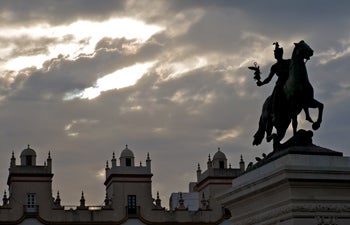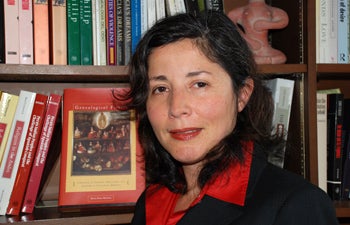When Worlds Collide
What is the legacy of Spanish colonialism in the Americas and how does it still affect Latin America and Latinos in the United States today?
This question is raised in the upcoming PBS documentary When Worlds Collide: The Untold Story of the Americas After Columbus, and it’s one that María Elena Martínez, associate professor of history, and American studies and ethnicity in USC College, finds intrinsically fascinating.
“You can’t understand present Latin American societies and Latino communities in the U.S. without understanding the more than 300 years during which Latin America was under Spanish rule,” said Martínez, who served as the film’s main academic adviser and Web content editor. She also appears throughout the 90-minute documentary as one of the interviewed experts.
The documentary, which was the brainchild of filmmaker Carl Byker (Andrew Jackson: Good, Evil and the Presidency), focuses on the early modern Spanish empire and the Latin American societies that emerged under Spanish colonial rule starting in the 16th century.

During the Age of Exploration, Christopher Columbus sailed from Cádiz, Spain on his second and fourth voyages. The city (seen here) later became the home port of the Spanish treasure fleet. Photo credit Mitchell Wilson.
The film not only addresses what Martínez says is the mistaken belief that the Old World merely “conquered” the New,but it discusses some of the cultural and scientific achievements of native peoples of the Americas, and the resulting mestizo or mixed culture that came from the multiple and ongoing relations of people of European, indigenous and African descent.
“There were flows of influence back and forth,” Martínez said, citing intellectual currents, culinary trends, art, cultural practices and political economy. “Not just what Spain gave to the Americas, but what the Americas and the societies of the New World gave to Europe.”
Author and journalist Rubén Martínez (no relation to the professor) joined the project as host intent on discussing the themes of mestizaje or mixture in depth. But he was unsure where to begin.
“I had some perfunctory knowledge of the topic — any Latin American or Latinodoes because it’s an essential way in which you understand identity in the South,” Rubén Martínez said. “But I was far from knowing where the recent scholarship was on the theme.”
That’s where Martínez came in.
“María Elena Martínez played a critical role in the documentary,” Rubén Martínez said. “Her work gave the documentary a more dynamic and nuanced understanding of issues of race and identity in 16th century Spain and the Americas.”
For María Elena Martínez, working as the film’s main script supervisor was an enjoyable experience, and one that gave her the opportunity to slightly reframe the discussion on Latin America to acknowledge that all cultures, peoples, and religions — not just the societies in Colonial Spanish America, have always been “mixed.”
“In the documentary, I tried to problematize the motif of mestizaje,” Martínez said. “Because by embracing that idea, you’re presupposing that there is something pure.”

USC College historian María Elena Martínez served as the main academic adviser in When Worlds Collide, a PBS documentary premiering on KCET September 27 at 9 p.m. PST. Martínez is also interviewed in the film. Photo credit Pamela J. Johnson.
In her book, Genealogical Fictions: Limpieza de Sangre, Religion and Gender in Colonial Mexico (Stanford University Press, 2008), Martínez argues that purity and mixture can be dangerous concepts to believe.
“These ideas can become the fictions of nations that see themselves as pure or as having some pure core,” Martínez said. “They can become the fictions of individuals or groups that see themselves as pure or mixed, and they can come at a cost of not recognizing the plurality of communities.”
Latin America is one example.
“Latin America often gets cast as the laboratory of mixture, the place where everybody comes together,” Martínez said. “I think there is something very dangerous in that because it assumes that other cultures are pure and it accepts the idea of purity and exoticizes Latin America.”
She hopes the documentary will help a broader audience understand the significance of this particular historical period and its role in the interconnected histories of Latin America and the U.S. — and the dangers surrounding ideas of purity and mixture.
“What we need is a new language and a new way of thinking about these terms and historical processes,” Martínez said. “Because questions about identity and what it means to have multiple ancestries — which were so relevant for people in the early modern period — are still relevant today.”
When Worlds Collide premieres nationally on Monday, Sept. 27, 2010. It airs in Southern and Central California on KCET at 9 p.m.